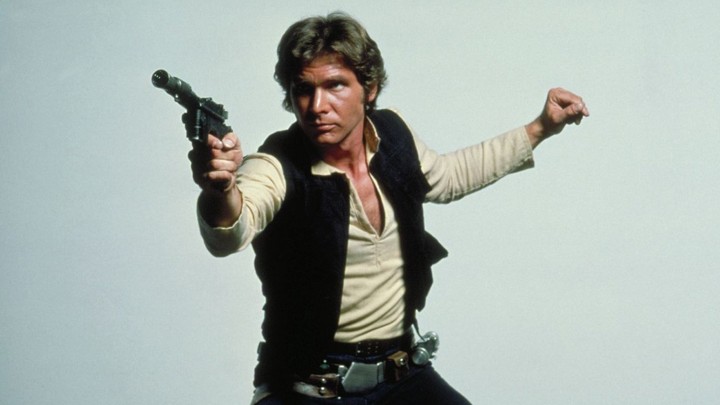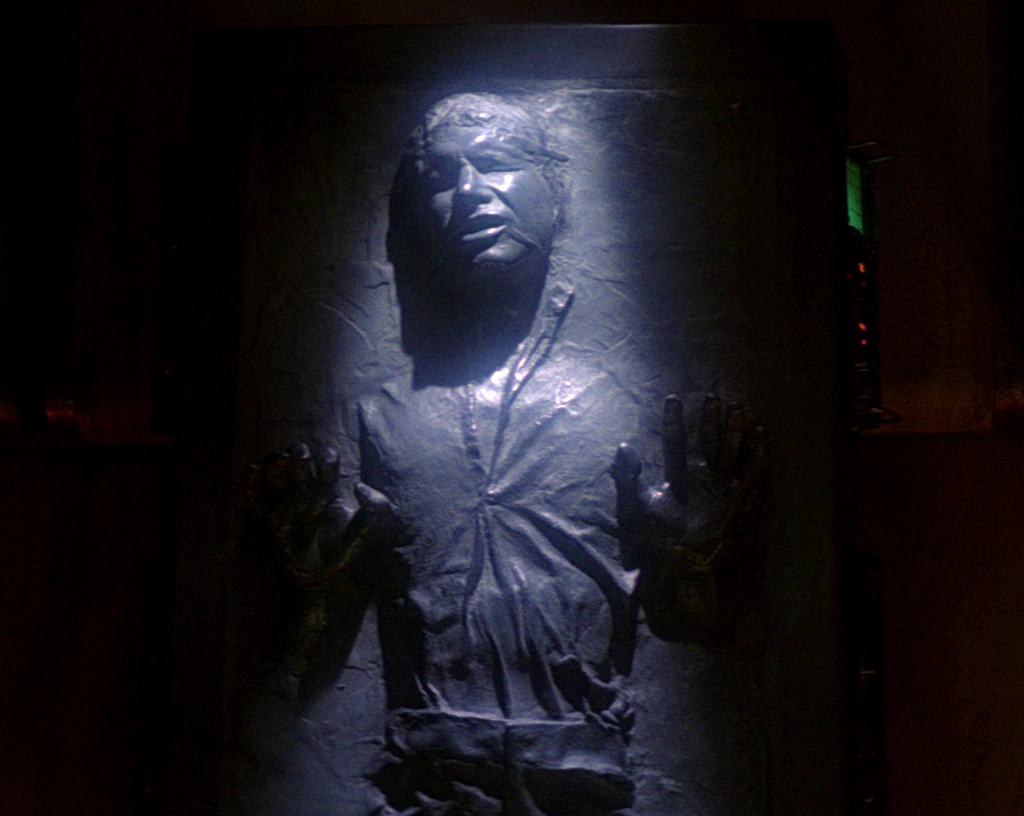 |
| Fox / Lucasfilm |
The Star Wars Franchise, guided by Disney's hand, killed Han Solo--not just in body but in spirit. Sure, Kylo Ren gave into his anger and it wasn't pretty, but it wasn't just Han the character that died. The idea of Han died too.
If you felt that something was off about the moment of Han Solo's death, then you've come to the right place to explore just why Star Wars made a major mistake when they offed one of their most beloved characters at the end of The Force Awakens.
Shoot First, Don't Bother With Questions
Han Solo was originally depicted as a shoot first, ask questions later kind of guy--if he even bothers to ask the questions. He's a man with no roots and no code except whatever survival dictates. Self-preservation comes first for Han Solo every time. And if he knowingly puts himself in danger, it's because he takes a universal view of self-preservation in the mode of Jeremy Bentham. Han is logical. He knows that running away from a battle could be the wrong thing for long-term self-preservation even if is clearly the best thing for short-term self-preservation. Han takes calculated risks. And if he walks into a trap, he's lucky enough, charming enough, or clever enough to work his way out of it--even if the trap gets him frozen in carbonite.

I am Your Father
Given the fact that Han didn't stay settled down with Leia--he's still pissing off merchants and mercenaries across the galaxy when we catch up with him in The Force Awakens--his attachment to Kylo Ren doesn't make too much sense. I don't mean that it doesn't make sense that he's Kylo's dad. Give any character long enough in this franchise and they'll find their way into an "I am your father plot." That's the bread and butter of Star Wars--flesh and blood fathers, surrogate fathers, father figures as teachers, comrades, and even corrupting influences. And if you're a guy in Star Wars, you've usually got some kind of fatherhood conflict:- Daddy issues as a result of having a bad father or an absentee father
- You are a bad father or you failed at fatherhood in some lasting way full of painful consequences
- Some combination of the above
- Darth Vader - the etymology of his name means "Dark Father"
- The Emperor - the dark father to dark fathers everywhere
- Yoda - a wizened, hermetic teacher qua father figure
- Obi-Wan Kenobi - also called "Ben Kenobi." Ben is Hebrew meaning son. Ben is the Rebel's "only hope," because of the concept of sonship, of the traditions of the Jedi order passing down their knowledge through generations. Ben--as a son of the Jedi tradition--has an ability to instruct others as a father instructs his progeny. But, of course, he did a really bad job of it with Anakin. He probably should have been less concerned with Anakin's Midichlorian count.
- Han Solo - Han is not supposed to ever act as a father figure. In the original movies, he's a foil to the father narrative arc. He doesn't really care about the Rebel cause--he's getting paid. Yes, he might have developed a friendship with Luke but this isn't in an effort to influence or teach Luke. He's never interested in the fatherly work of instructing a charge. Han is getting paid and then he's out.
So, when Han Solo walks across that big bridge to talk with Kylo Ren, it's completely out of his character. This is not the guy that replies "I know" to a declaration of love from Leia. Nor is this the guy that has been running away from traders that he's perpetually screwed over with bad deals or dodged payments.
The Force is Not Even Remotely Strong With This One
Han's freewheeling, me-first nature was important to Star Wars. In a galaxy full of cleanly polarized good and evil forces, Han provides an alternative that makes the world seem more real. Sure, within the forces of good, Star Wars offered heroes that doubt their abilities like Luke Skywalker. And in the Empire, complex characters like John Boyega's Finn prove to be pressed into service unwillfully and are more than happy to split given the opportunity. But your Luke's and Finn's gravitate toward serving, whether they serve the dark or light side of the force. Either way they, like most everyone in the Star Wars world, identify somehow with a dualistic system.Not Han Solo. The guy's freaking name is SOLO. He goes alone. To do anything other than go solo is a fundamental break with Han's nature and a reduction of the world of Star Wars to a too simple good against evil binary.
It's certainly fun to watch Luke learn to use the force through training and for Rey to discover the force despite a lack of training. But what makes the presence of the force more interesting are Han Solo types that operate without it--and are happy to do so.
Narratives are made stronger when they include pieces that don't fit neatly with the rest of the story.
Ready for more Rapid Transmissions?
Isaac Asimov - Foundation
Nancy Kress’s Terran Tomorrow